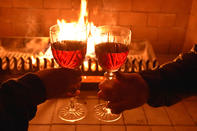From A to Z
We love wine - we drink it, we savour it, we celebrate it. But, we rarely talk about it! It’s so easy to get intimidated by the special wine language of French lingo, industry jargon and scientific explanations.

In the world of wine, there are endless clichés and complex terms that are used to describe something super simple. Although this may seem a little pretentious, the terms can come in handy if you find yourself in the company of true wine connoisseurs.
From A to Z, there’s a lot to get through, but not to worry! We compiled a list of the most commonly used and often head-scratching wine terms you should know:
Aroma - what a wine smells like; if you smell cherry, the wine probably has a fruity aroma.
Blush - a wine that is made from red grapes, but appears to be a salmon/pinkish colour. This is because the grape skins were removed from the fermenting juice before it could retain more colour.
Bordeaux-style wines - wines made in the style of Bordeaux, which is a large wine-producing region in France known for pioneering the classic wine varieties of Cabernet Sauvignon, Merlot, Cabernet Franc, Sauvignon Blanc and Semillon.
Cap - grape solids like the pits, skins and stems that rise to the top of the tank during fermentation. Caps give red wine its tannins, colour and weight.
Chateaux - the French word for ‘castle’, used to refer to an estate with its own vineyards.
Co-operative - a winery made up of multiple grape growers.
Decant - the process of transferring wine from the bottle to another vessel, with the purpose of aerating a young wine or to separate an old wine from any sediment.
Dosage - the sweet spirit that’s added to Champagne or sparkling wine. It determines the dryness or sweetness of the wine.
Oenology - the science of wine production.
Fumé Blanc - a fancy word for a dry Sauvignon Blanc.
Late Harvest - sweet wine made from grapes that were left on the vine for as long as possible.
Magnum - basically, a bigger bottle of wine.
Méthode Cap Classique (MCC) - the South African version of Champagne.
Negociant - a French word used to describe a wine producer or company that buys wine from others and labels it as its own.
Reserve - wines of a higher quality than normal bottlings.
Vintage - refers to a specific harvest year.